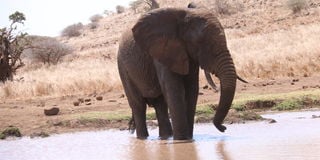Drought: Invasion of parks by livestock could heighten conflict, KWS says

An elephant takes water at the Lewa conservancy in Meru county. Farmers in the Nyambene area have blocked 11 0f 14 rivers feeding the nearby Meru national park, threatening water sources for wildlife.
Conservationists in the Eastern region have expressed concern about possible human-wildlife conflict in areas surrounding parks due to an invasion by herders seeking pasture for their livestock.
Most wild animals had fled Kora National Park after it was overran by herders from Garissa, Tana River and Wajir, said Robert Obrein, KWS assistant director in charge of the region.
He said camels, goats and cattle from as far away as Mbalambala, Wajir and Garissa had pushed nearly all wild animals, mainly elephants, to Meru National Park.
Speaking to the Nation, Mr Obrein said they had driven away over 20,000 cattle and goats from Moyale and Marsabit but thousands remained, straining pasture for wild animals.
Though wild animals had enough grass to last until November, he said, competition from livestock, especially in Meru National Park, could threaten wildlife survival.
The situation has been compounded after 11 of the 14 rivers that feed the ecosystem stopped flowing into the park after they were blocked by the farming community for irrigation.
The KWS is considering approaching the farmers to allow water flow into the park at least two days a week to prevent wild animals from moving out of park to seek water.
“The farming community in the western boundary of Nyambene have blocked water for irrigation, thus cutting off flow into the park,” Mr Obrein said.
“This is a recipe for human-wildlife conflict since animals like elephants cannot stay without water … The park is well, we have enough grass and if we are not disturbed, we can go up to November.”
But he warned herders heading into Tharaka from the western boundary, saying they faced stern action if they trespassed into the park’s rhino sanctuary.
The sanctuary is heavily guarded against poachers.
“There is not enough maize stalk in Tharaka that can sustain them for more than one week. We are afraid they could enter the sanctuary and it will be bad,” Mr Obrein said.





